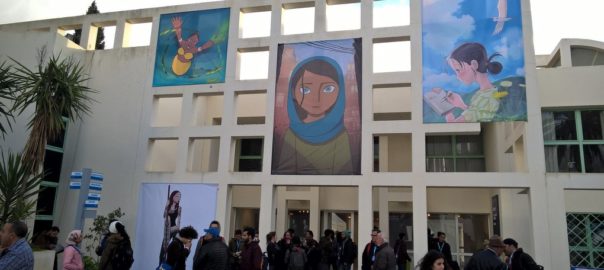After an exciting week in the mythic city of Tangier for the Moroccan National film festival, I went to Meknès for another festival, one with international ambitions: FICAM, or the International Festival of Animation in Meknès. The festival runs over 5 days and is held at the Institut Français in the new town, while we were staying in a riad in the old town. The walk to the festival is steeply uphill, and so we usually arrived at the film screenings very ready for a refreshing mint tea and a film.
FICAM was launched in 2000 and focuses on animations from the international circuit. Mohammed Beyoud, FICAM’s creative director, inaugurated the festival with an eye on the promotion of the art of animation, through both animated film screenings and educational workshops. Beyoud invites animators and filmmakers from both commercial and independent backgrounds to showcase their work and provide, as speakers, valuable knowledge on a range of animation practices. It is a very open-minded festival, with a focus on students’ experiences and development. This is perhaps most obvious in the workshops and conferences that take place every day in the médiathèque: the festival’s organisers and the speakers gear their introductions and talks to the students, and constitute an inherently encouraging, if somewhat intense, part of the fest.

This year, FICAM’s focus was on women in animation, its trailer showcasing female figures from all over the world, including Arab, African, Japanese and European women in animation. Indeed, the banners stated assertively: “L’Afrique s’exprime” and “L’Occident est au rendez-vous”. The main guest of the festival was Brenda Chapman, best known for her directorial work on Brave (2012), The Prince of Egypt (1998) and The Lion King (1994). Chapman gave the festival’s lecture on its first day, focusing on her own and other women’s contributions to American animation. Other guests were Carlos Saldanha and Sunao Katabuchi and one particularly interesting talk was about the depiction of the Arab in American animation, delivered by Rachid Naim from the University of Safi.

The festival is funded by the Aïcha Foundation and the French Institute, and it receives institutional support from CCM, TV5Monde and 2M. CCM does not pay enough attention to animation, and that can only change for the better if FICAM and its visitors keep their precious work going. As Meknès is the heart of the agricultural region in Morocco, and Aïcha, as the largest concern in the canning industry, is an appropriate local funder. It was founded in the 1920s, and connects the local agricultural industry to the wellbeing of its future consumers. The mascot, a young girl, has transformed over the years into an animated advertising tool with characteristics of Snow White, as she looks and acts completely innocent, has seven companions who work hard and have distinct, individual personality traits. They all adore and protect Aïcha. (To see an example of how Aicha is animated for TV advertising, see here). The brand has grown to such an extent that as soon as Aïcha appears on screen at FICAM the young audiences go mad with enthusiasm and start clapping and singing along loudly to the tunes. The seven companions were outside in the courtyard of the French Institute, waiting for us to come out of the films and entertain all of us, but mostly the youngest kids who laughed, danced and played with them in between screenings. Animated advertising is therefore recognised as having an enormous influence on the industry of animated film at the festival, while the brand also supports and recognises the importance of the festival and its international reach.
This year, FICAM had 6 feature films in competition: Mutafukaz by Guillaume Renard and Shojiro Nishimi (France/Japan, 2017); Minga and the Borken Spoon by Claye Edou (Cameroon, 2017); In this Corner of the World by Sunao Katabuchi (Japan, 2017); Nelly and Simon: Mission Yéti by Nancy Florence Savard and Pierre Graco (Canada, 2017); A Silent Voice by Naoko Yamada (Japan, 2017); and Un Homme est mort by Olivier Cossu (France, 2018). These six films were all shown in the presence of their directors, with a short intro and an extensive Q&A after the screenings. All of the directors were either very pleasantly surprised by the attention they received in screening rooms filled with children and young people, or they commented on how much they loved FICAM and how excited they were to be there again, among the children, to speak to them and engage with the students. FICAM clearly focuses on the audience and on the education of the next generation of animation lovers and animation artists.
Out of competition the festival screened 1917 – The Real October by Katrin Rothe (Germany/Switzerland, 2017); Zombillenium by Arthur de Pins and Alexis Ducord (France, 2017); Iqbal, l’enfant qui n’avait pas peur by Michel Fuzellier and Babak Payami (France/Italy, 2016); Coco by Lee Unkrich and Adrian Molina (USA, 2017); The Jungle Bunch by David Alaux (France, 2017); Ferdinand by Carlos Saldanha (2017) and Drôles de petites bêtes by Arnaud Bouron and Antoon Krings (2017).

There was a special focus on Japanese anime, with classics such as Momorato by Mitsuyo Seo (1945); Arrietty by Sunao Katabuchi (2001); as well as newer materials such as Lou over the Wall (2017); The Napping Princess by Kenji Kamiyama (2017) and Mazinger Z by Junji Shimizu (2017).
The short film competition likewise was incredibly rich, with films from all over the world, and ran over four days, screening five to six films every evening at 9pm. This wide variety was matched by the array of professionals, students and fans at some of the many talks, discussions, roundtables and ‘thé à la menthe’ moments in the café of the Institut Français. In the coming blog entries, I will reflect a little bit more on each of these aspects of FICAM, and on the winners of the competitions.
Stefanie Van de Peer
